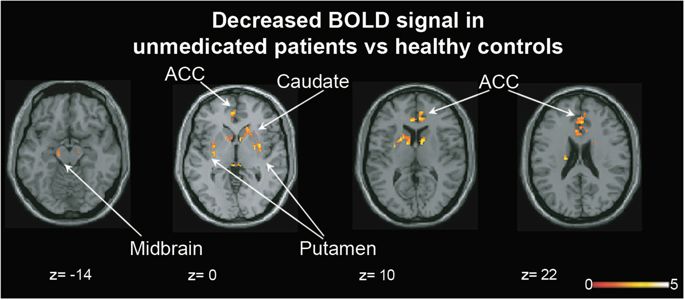npj Schizophrenia ( IF 5.7 ) Pub Date : 2018-05-07 , DOI: 10.1038/s41537-018-0051-y Elyse J Cadena 1, 2 , David M White 1 , Nina V Kraguljac 1 , Meredith A Reid 3 , Adrienne C Lahti 1

|
To understand the mechanism of cognitive control dysfunction in schizophrenia, it is critical to characterize brain function without the confounding effect of medication. It is also important to establish the extent to which antipsychotic medication restores brain function and whether those changes are related to psychosis improvement. Twenty-two patients with schizophrenia, initially unmedicated and after a 6-week course of risperidone, and 20 healthy controls (HC) studied twice, 6 weeks apart, performed an fMRI task. We examined group and longitudinal differences in anterior cingulate cortex (ACC), striatum, and midbrain functional activity during performance of a Stroop color task as well as activity patterns associated with improvement in psychosis symptoms. Unmedicated patients showed reduced functional activity in the ACC, striatum, and midbrain compared to HC. Post hoc contrasts from significant group-by-time interactions indicated that, in patients, drug administration was associated with both activity increases and decreases. In unmedicated patients, greater baseline functional activity in the striatum and midbrain predicted subsequent better treatment response. Greater changes in functional activity in ACC and ventral putamen over the course of 6 weeks positively correlated with better treatment response. Unmedicated patients show reduced activity in brain networks pivotal for cognitive control and medication is associated with functional changes in these regions. These results suggest a mechanism by which antipsychotic medication has a beneficial effect on cognition. Our results also support the notion that treatment response is determined by a combination of the baseline pattern of brain function and by the pharmacological modulation of these regions.
中文翻译:

未经药物治疗的精神分裂症患者认知控制过程中额纹状体网络的评估以及抗精神病药物的效果
为了了解精神分裂症认知控制功能障碍的机制,在不受药物混杂影响的情况下表征大脑功能至关重要。确定抗精神病药物恢复大脑功能的程度以及这些变化是否与精神病改善相关也很重要。22 名精神分裂症患者最初未接受药物治疗,接受为期 6 周的利培酮疗程后,以及 20 名健康对照者 (HC) 进行了两次研究,间隔 6 周,进行了功能磁共振成像任务。我们检查了执行斯特鲁普颜色任务期间前扣带皮层(ACC)、纹状体和中脑功能活动的组别和纵向差异,以及与精神病症状改善相关的活动模式。与正常人相比,未接受药物治疗的患者 ACC、纹状体和中脑的功能活动降低。事后对比显着的按时间分组的相互作用表明,在患者中,给药与活动的增加和减少相关。在未接受药物治疗的患者中,纹状体和中脑基线功能活动的增加预示着随后更好的治疗反应。6 周内 ACC 和腹侧壳核功能活动的较大变化与更好的治疗反应呈正相关。未接受药物治疗的患者表现出对认知控制至关重要的大脑网络活动减少,而药物治疗与这些区域的功能变化有关。这些结果表明抗精神病药物对认知产生有益影响的机制。我们的结果还支持这样的观点:治疗反应是由脑功能的基线模式和这些区域的药理学调节相结合决定的。











































 京公网安备 11010802027423号
京公网安备 11010802027423号